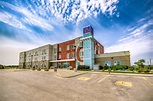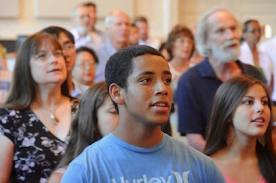Focal Passages: Jeremiah 29:11-13 and Proverbs 3:1-6
Graduation from either high school or college is a beautiful moment of celebration—a capstone of years of study, late nights, tests and struggle.
I sat through 147 of them in my career and only two of them were mine. Every graduation I attended buzzed with excitement and emotion. Classmates hugged or slapped each other on the backs, relieved that that piece of paper they’d been working toward for so long had been signed, sealed and delivered.
I watched thousands of graduates cross the stage each year, thrilled to see the unadulterated joy in the faces of the students as they held the diploma high, searching the crowd for their proud parents. As I sat on that stage year after year, I also noticed as each graduate sat back down waiting to toss those mortar boards into the air, there was a moment when the smile faded, replaced by that 1,000-yard stare. I could almost read their minds as they pondered, “What’s next?”
Equally exciting and terrifying, that question is relevant and filled with more uncertainty that anyone cares to admit. Those of us who have made that journey through life know how our best laid plans often morph into something unexpected.
What’s next? What would you tell that graduate you know?
At a time like this, it is easy to look inward for guidance and understanding. What are my dreams? What do I enjoy doing? What do I want out of life? Where do I go from here?
Scripture, however, points us not inward, but upward. Solomon’s wise words in Proverbs 3:1-6 provide comfort in the uncertainty of ‘what’s next.” He also offers practical wisdom for how to step forward with confidence and faith. In Solomon’s words to his son, you hear God’s voice speaking to all of us.
“Do not forget my teaching. Keep my commands in your heart…” (Proverbs 3:1)
Solomon’s tone is tender, wise and equally urgent. Standing on the threshold of uncertainty, stay grounded in what you’ve been taught. Remember what is truth. It’s not an academic reminder. It’s spiritual.
Whether we grew up in our faith or came to it later in life, this word reminds us to cling to the commands of God and his word. The world constantly works to reshape our identity, telling us that our worth is in our grade point average, our income, our popularity or fame, or our most recent accomplishment. God says otherwise. Remember what you’ve been taught about his character and his love and the way he wants us to live.
“Let love and faithfulness never leave you; bind them around your neck, write them on the tablet of your heart.” (Proverbs 3:3)
Love and faithfulness are the very character of God. Make them a part of who you are, engrave them on your heart and in your soul. Let them be the compass that guides your decisions and your actions as you navigate the foggy terrain of life. Allowing your life to be driven by selfish ambition or fear leads nowhere. Instead, allow your love for God and others to shape our next steps, to inform your every choice and decision.
Then, we see the more familiar part of this passage.
“Trust in the Lord with all your heart and lean not on your own understanding; in all your ways submit to him and he will make your paths straight.” (Proverbs 3:5-6)
Left to our own thoughts, success makes us feel invincible. Uncertainty makes us feel invisible. Our understanding, even of what is best for us, is limited, shaped by fleeting emotions, cultural noise and incomplete knowledge. When we can’t see around the bend, God sees the entire path. He knows where every road leads.
Because he knows the path we’re walking and he knows where he wants to so go, God offers a promise in this passage. Submit to him. That doesn’t mean your life becomes easy, without its share of difficulty and heartache. It means it will be “straight.” Your life aligned with God’s perfect will and desire for your life, always leading to his purpose and desired outcome. Always anchored in his love.
It is a thought echoed in Jeremiah 29:11.
“I know the plans I have for you, declares the Lord, plans to prosper you and not to harm you, plans to give you hope and a future.”
We too often make this passage a motivational poster: God’s got this! Everything will be fine. Nothing bad will happen to me.
See the passage in its context, though. These words are spoke to exiles—people ripped from their homes, living in a far away land, wondering if God had forgotten them. They had every reason to ask, “What’s next?”—not out of excitement, but out of despair.
God’s words through his prophet are meant to encourage and reassure them. “I know the plans…,” he says, not you. Not, you can figure them out on your own. “I know…” You see, when we don’t know what’s next, God knows. His plans for us are intimate, intentional and infinite, far greater in purpose and meaning than anything we could come up with on our own.
His plans will bring about spiritual and relational prosperity.
Despite the difficulty of the path, even if the journey is hard, God’s plan will never destroy us. Rather, they will always bring about hope and a future. It’s not vague reassurance. It is a divine guarantee.
Here’s the catch and one we don’t see if we don’t keep reading in Jeremiah.
“Then you will call on me and come and pray to me, and I will listen to you. You will seek me and find me when you seek me with all your heart.” (Jeremiah 29:12-13)
The promises of Jeremiah 29:11 find fulfillment only when we chase after God in wholehearted pursuit. He isn’t calling us to sit back passively and wait for his direction. He’s inviting us to pray. To actively look for him and his path. To seek him passionately and persistently. To connect with him. To follow him with all our heart.
Florence Nightingale grew up in a wealthy British family in Embley Park in Southampton. She was well-educated, fluent in multiple languages and expected to marry well and live a life of social refinement and leisure—hosting dinners, engaging in cultural events and managing the household estate.
When she turned 16, Florence wrote in her diary of a divine calling, sensing that God was leading her off the linear path she thought she was on to serve him as a nurse. At the time, pursuing a career in nursing was a scandalous choice for a woman of wealth. Elite English society and her family opposed her decision, deeming it beneath her station.
Her diary entry said, “God called me in the morning and asked me if I would do good for him alone without reputation.”
Shifting from a life of comfort to a life of purpose and sacrifice was central to her legacy. She became the founder of modern nursing and dedicated her life to reforming health care, improving hygiene and training nurses, all as an outgrowth of her Christian faith and conviction. She revolutionized nursing during the Crimean War by working tirelessly in harsh conditions taking care of wounded soldiers…a real-life Margaret Houlihan in a 19th century M*A*S*H unit.
If you had asked her at 15 years-of-age to tell you what’s next, she would have described a very different life than what she lived when she submitted to God’s plans to “prosper her, not to harm her and to give her hope and a future.” What a difference she made in the lives of so many when she let go of her plans and aligned her purpose to God’s will!
Graduation is the beginning. It is not the end. It is the start of a long, winding journey of growth challenge and purpose. That’s what those of us who have been there, done that, want our graduates to understand.
However, I don’t care if you are graduating high school, college or doing whatever it is you do decades after you got that diploma. Here’s the message for all of us when life leaves us asking, “What’s next?”
The joy we find in life…the meaning we find in life… is at its deepest when we’re doing what God calls us to do. When we remember his words and bind them in our hearts. When we set aside what we think we know and what we think we want. When we put our lives in his hands and submit to his will. When we seek him out in prayer and Bible study for his direction and guidance in life.
Our joy and our purpose come when we make him Lord of our lives.
May this be our prayer:
Thank you, God, for walking me through every season of life…from the classroom to the unknown. Help me trust you fully, even today, and lean not on my own understanding. I surrender my plans, my worries and my future into your hands. Lead me on the path you have prepared. When I stray from it, bring me back. Help me seek you with all my heart. I pray this in the strong name of Jesus Christ, Amen!
THINKING POINTS
Proverbs 3:3 says, “Let love and faithfulness never leave you.” What might it look like in your life right now to make love and faithfulness your guide in decisions about your future—especially when the world measures success differently?
Jeremiah 29:11 is a favorite verse for many, but verses 12-13 speak of seeking God with your whole heart. How are you actively seeking God’s direction in this season of your life? How could you pursue him more fully?
Is there a dream or opportunity in your heart that might require stepping away from what’s easy in order to pursue what’s godly?
Think back on what you’ve been taught about God’s character and promises. How can remembering those truths help you navigate the pressure and uncertainty of what’s next in life?
*****
Author’s Note: If you want to receive this blog via email, click www.drkirklewis.com. Find the “Subscribe” button and enter your email address. That’s all it takes. Your email will not be released to anyone else.







